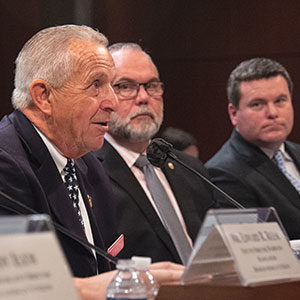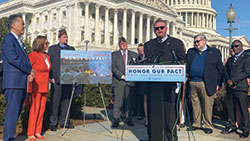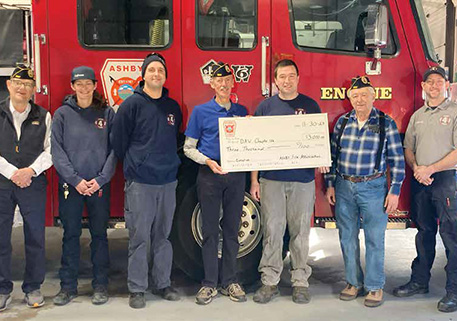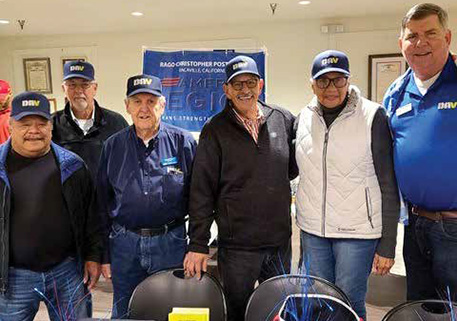
From a ballroom in Arlington, Virginia, a crowd of DAV members watched National Commander Andy Marshall address a joint session of the House and Senate Veterans’ Affairs Committees as part of the 2022 DAV Mid-Winter Conference.
The conference looked and felt a little different this year due to lingering COVID-19 restrictions on Capitol Hill, which kept members from attending the hearing in person but did not diminish the gravity of Marshall’s words.
He shared an emotional recollection of his encounter decades earlier with a Marine combat veteran in crisis at a VA Vet Center. The man, named Tom, was desperate for help and thinking of ending his own life as he struggled with the psychological trauma of the Vietnam War and the Department of Veterans Affairs’ denial of his claim for post-traumatic stress disorder.
“I knew he was particularly vulnerable to self-harm, and I accompanied him to a meeting with his Vet Center counselor,” Marshall told the committee members.
DAV took on Tom’s claim, appealed and ultimately won, providing him with additional financial support. Marshall told lawmakers that after the VA acknowledged Tom’s trauma and granted him benefits and access to needed care, he never considered taking his own life again.
“Tom was saved by the right combination of lifesaving factors, but there are far too many situations that have ended in tragedy,” said Marshall.
Tom was just one of many veterans struggling with service-related mental health issues who Marshall encountered throughout his 41-year career as a DAV benefits advocate. It’s a trend that has not let up. The Vet Center program logged over 1.6 million visits and outreach contacts in 2021, with a 35% uptick over the past five years.
In his testimony, Marshall reiterated the critical need for VA mental health resources, staffing and funding. He also called on Congress to safeguard the VA’s overall health care capacity, ensuring the right health care infrastructure in the right locations to meet rising demand for care as the independent Asset and Infrastructure Review Commission prepares to vote on recommendations for modernization and realignment of VA facilities.
For his part, VA Secretary Denis McDonough addressed this issue with DAV members at the Commanders and Adjutants Association opening session, vowing that veteran stakeholder groups including DAV would be involved in the process before changes to any VA facilities are made public.
“There will be changes in markets across the country, but let me underscore that we are leaving no market. VA is here to stay,” McDonough said.
“In the places where there are changes, we will be shifting toward new infrastructure, or different infrastructure, that accounts for how health care has changed; that matches the needs of a market; that strengthens our research and education missions; and that—most of all—ensures that the veterans who live in that location will have access to the world-class care they need, when they need it.”
Both McDonough’s remarks and Marshall’s congressional testimony also touched on the need to take comprehensive action to address the legacy of injuries and illnesses from burn pits and other toxic exposures.
“As a Vietnam veteran, I know the long-term negative health effects of Agent Orange,” Marshall told Congress. “I lived through the long struggle before Congress and VA took action to recognize the damage from those toxic exposures. Unfortunately, this same inaction has plagued subsequent generations of veterans.”


DAV and other veterans organizations have ratcheted up demands for a new approach to solving the puzzle of toxic exposures, something Congress—and now the VA—have responded to. “Over the past year, we’ve made real progress on this by getting rid of the old, onerous model that VA traditionally used to determine presumptive conditions and replacing it with a new pilot model that takes all available science and veteran claims data into account,” said McDonough.
Toxic exposures were just one of the critical policy issues members addressed in meetings with their lawmakers at the conference, making the most of the experience and carrying the organization’s message to Capitol Hill—both in person and some virtually.
Donald Peek, an Army veteran and past Department of Indiana commander, was able to attend his meetings in person this year, something he says was important even though it was more logistically complicated.
“I normally use the tunnel system between the buildings, but because they were on lockdown, we had to wait outside and call for an escort into the building,” said Peek. “But I was very glad to get back in the saddle and see them. It’s important that DAV members get in front of their senators and representatives, especially face to face.”
The meetings in Washington, D.C., Peek noted, are a complement to his efforts back home in Indiana, where relationships with lawmakers and their staff are cemented.
“Congressman Hollinsworth, who is my representative, actually sent me a postcard afterward saying thank you and that he really enjoyed the dialogue during our meeting,” Peek added. “These meetings are so beneficial, because if they don’t hear from you, they’re sort of flying blind.”
Members also had the opportunity to attend the traditional in-person sessions, including the Benefits Protection Team Seminar.
Dr. Lisa K. Kearney, executive director for the Veterans Crisis Line with the VA Office of Mental Health and Suicide Prevention, spoke at the seminar, discussing how everyone has a role to play in addressing veteran mental health crises and suicide prevention.
She highlighted the new three-digit crisis line number—988—scheduled to become active later this year as well as a new VA awareness campaign video encouraging veterans in crisis not to wait but to reach out for help at va.gov/reach. Kearney also touched on the importance of veterans organizations in carrying out this message, recounting a conversation with DAV Past National Commander Butch Whitehead about ice fishing trips hosted for veterans through the Department of Minnesota and how the trips serve as important opportunities to connect.
“It reminded me of being a little girl when my dad would take me on fishing trips,” said Kearney. She recalled her father and his friends sitting around, sharing stories and finally opening up about painful military experiences. Whether in an ice fishing hut or during a DAV meeting, these conversations are opportunities for healing, she said.
“I’m not out there in those ice huts; you are,” she added, noting how important DAV members are in preventing suicide. “You’re the ones having those conversations.”
Also at the seminar, National Legislative Director Joy Ilem presented this year’s Outstanding Performance in Advocacy (OPA) awards to five DAV departments and their Benefits Protection Team leaders: Tom Wendel (Virginia), Brian Wilner (South Carolina), Al Labelle (Wisconsin), James Shuey (Nebraska) and Joseph Hall (North Carolina). Awards were also given to the departments of Virginia (Division I), South Carolina (Division II), Wisconsin (Division III), Nebraska (Division IV) and North Dakota (Division V).
DAV also announced that seven dedicated veterans advocates—federal executives, senators, representatives and congressional staffers—were being honored for their outstanding efforts and achievements on behalf of the men and women who served. They included Veterans Champion awardee Sen. Jerry Moran; Outstanding Senate Legislator of the Year Sen. Thom Tillis; and Outstanding House Legislator of the Year Rep. Mark Takano, chairman of the House Veterans’ Affairs Committee. Special recognition awards were also presented to Mike Fisher, Veterans Health Administration chief readjustment counseling officer; Justin Vogt, House Veterans’ Affairs Committee staff director; David Shearman, Senate Veterans’ Affairs Committee minority staff director; and Simon Coon, Senate Veterans’ Affairs Committee staff member.
“The recipients of this year’s advocacy and OPA awards have illustrated an unmatched commitment to fighting for the best interests of veterans and their families,” said Marshall. “Veterans are a nonpartisan issue, and these honorees worked tirelessly to ensure our nation keeps its promises to our nation’s heroes.”






